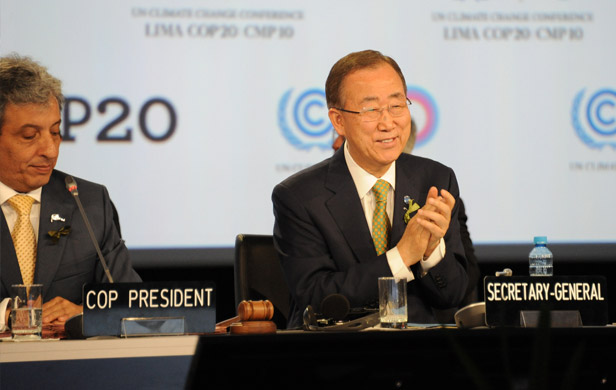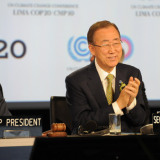
The carbon emission numbers are disquieting. Despite the 2009 pledge of multiple nations to reduce the release of their greenhouse gases so that global average temperatures do not rise by more that 2°C, the total tonnage of carbon dioxide keeps going up. The chief scientist for the United Nations Environment Program, Joseph Alcamo, issued a November 2014 climate report that calculated the emissions for all such gases, including methane, must peak by 2030 at 42 billion tonnes per year and then fall to zero by the end of the century if the 2°C target is to be met.
Long way to go
The likelihood of reaching this target is getting more and more remote. According to the UN report, all indications are that emissions will continue to rise until 2050, at which time they will be 15 to 19 billion tonnes per year above the 42 billion tonnes ceiling. This means that by 2050, 20 years after emissions should have peaked and started to decline, another 300 to 380 billion tonnes of greenhouse gases will have been added to the biosphere — plus, of course, the approximately 17 billion tonnes that should have been reduced from the 42 billion for the period between 2030 and 2050.
The prospects for keeping the global average temperature rise below 2°C is now looking bleak. Granger Morgan, a climate scientist from America’s Carnegie Mellon University, noted that keeping to this target given today’s circumstances “is akin to a 60-year old man who resolves to be 25 years old next year. It ain’t gonna happen, but it’s time to get really serious about achieving what we can.” As some scientists have already considered, this would mean abandoning the 2°C target.
2°C: a compromise from the get-go
But the 2°C target was chosen as a realistic balance between two uncomfortable alternatives, what Dr. John Holdren, former Science and Technology advisor to US President Obama, describes as “the best we can do, while being the worst we can tolerate.” Abandoning the target would offer only a temporary relief in the pressure to reduce emissions, thereby creating the opportunity for further procrastination, increasing the difficulty of meeting future reductions, and raising the threat of environmental damage.
BC, Canada on wrong track
Canada is not going to come close to meeting the reductions it promised in 2009. British Columbia, if it continues with its dream of an LNG industry, is going to shatter any prospect of containing its present level of greenhouse gas emissions.
Alberta now appears as an anachronistic petro-state enthusiastically drilling and digging toward the edge of ecological doom. Even the vague emission reductions recently agreed to in bi-lateral discussions between the United States and China are not going to change significantly the global carbon calculations. The US intends to reduce its 2005 emissions by 28% by 2025 (about 2 billion tonnes), while China has agreed to reach unspecified maximum emissions by 2030. But something is better than nothing, and the agreement by the world’s top two emitters is bringing hope that the December 2015 climate talks in Paris will be able to reach legally binding agreements on carbon reductions.
Mark Carney climate chorus
Hope, of course, comes coupled with pressure as impatience for action escalates through frustration toward desperation. Cracks are appearing in the facade of pretending. One of the most surprising examples came from Mark Carney, the former governor of the Bank of Canada who is now the governor of the Bank of England. At an October World Bank seminar, he repeated the brooding reality that first received publicity two years ago.
The world’s known fossil fuel reserves were then estimated to represent 2,795 billion tonnes of carbon dioxide emissions if burned, of which only 565 billion tonnes could be burned if global temperatures were to be kept below the 2°C target. In Carney’s judgment:
[quote]The vast majority of [these] reserves are unburnable, [so will have to be considered as] “stranded assets”.[/quote]
Signs of hope
Other signs of hope mark the laborious struggle to control global greenhouse gas emissions as it becomes attached to local concerns. More carbon emissions accounts for one of the essential objections to the movement of Alberta’s tar sands bitumen through Enbridge’s Northern Gateway Pipeline to Kitimat.
Similarly, it’s one of the reasons why 126 people — including children, grandmothers and university professors — chose to be arrested in Burnaby for protesting Kinder-Morgan’s Trans Mountain Pipeline proposal. Concerns about greenhouse gas emissions are connected to the shipment of American coal through Vancouver and Texada Island. The global has become inseparable from the local.
Canada stands in way of climate progress
This is the context in which Canada’s government has been thwarting emission controls while promoting its oil and gas policies. Fossil fuels simply do not — and cannot — have a significant future in any equation that is going to provide an optimistic option for our unfolding energy needs. Continuing to disregard the nearly invincible wall of peer-reviewed climate science would almost certainly be disastrous.
Indeed, decades of delays in reducing our carbon dioxide emissions is already moving us into threatening circumstances.
At this very moment humanity is writing a crucial chapter in its history. What we and our politicians decide to do about carbon emissions will likely be the single largest determinant in defining our legacy, in shaping the lives of generations to come, and in regulating the health of our planet.
All the important evidence suggests that this is not rhetorical hyperbole. Each one of us, from our prime minister, our premiers and our elected governments to every citizen will be measured by the decisions that we make in the immediate future. The numbers are clear, the calculations are disquieting, and the opportunity for avoiding a colossal tragedy is rapidly closing.


Why is climate action being ignored?
Why can’t someone do something to force a beneficial change?
I would do it; but it seems I have absolutely no power to stop it, is that correct?
So why do I always read that “WE” are responsible, when as “WE” I have no control over anything other than my own actions. Which, lets face it, are micro on the grand scale of things.
I would also be considered poor by todays standards, my impact on life is minimal at best in comparison to many others. No politician listens to me, I’ve tried, no corporation listens to me I’ve tried. Other then my own actions I cannot change a damn thing. Please do not call me “WE”!